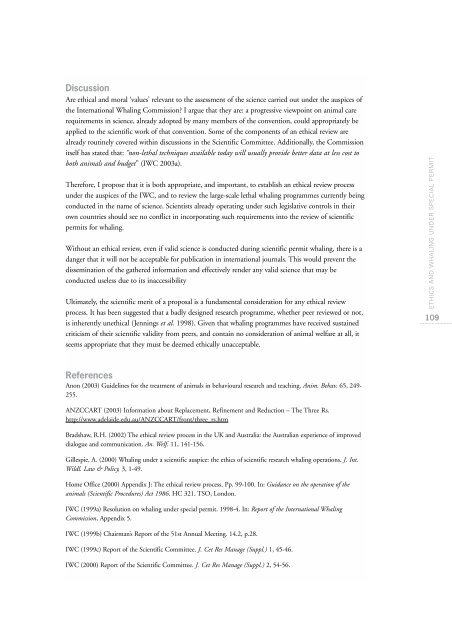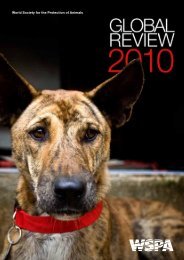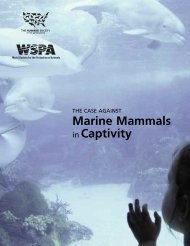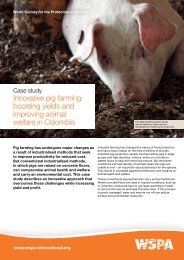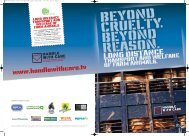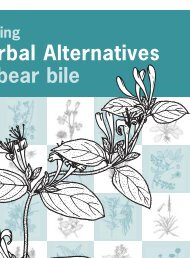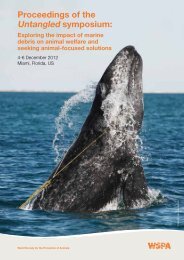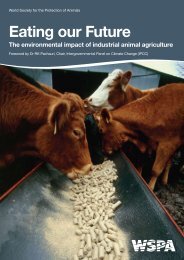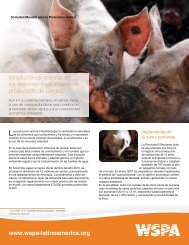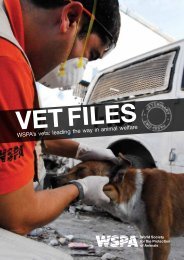TROUBLED WATERS - Whale and Dolphin Conservation Society
TROUBLED WATERS - Whale and Dolphin Conservation Society
TROUBLED WATERS - Whale and Dolphin Conservation Society
- No tags were found...
Create successful ePaper yourself
Turn your PDF publications into a flip-book with our unique Google optimized e-Paper software.
DiscussionAre ethical <strong>and</strong> moral ‘values’ relevant to the assessment of the science carried out under the auspices ofthe International Whaling Commission? I argue that they are: a progressive viewpoint on animal carerequirements in science, already adopted by many members of the convention, could appropriately beapplied to the scientific work of that convention. Some of the components of an ethical review arealready routinely covered within discussions in the Scientific Committee. Additionally, the Commissionitself has stated that: “non-lethal techniques available today will usually provide better data at less cost toboth animals <strong>and</strong> budget” (IWC 2003a).Therefore, I propose that it is both appropriate, <strong>and</strong> important, to establish an ethical review processunder the auspices of the IWC, <strong>and</strong> to review the large-scale lethal whaling programmes currently beingconducted in the name of science. Scientists already operating under such legislative controls in theirown countries should see no conflict in incorporating such requirements into the review of scientificpermits for whaling.Without an ethical review, even if valid science is conducted during scientific permit whaling, there is adanger that it will not be acceptable for publication in international journals. This would prevent thedissemination of the gathered information <strong>and</strong> effectively render any valid science that may beconducted useless due to its inaccessibilityUltimately, the scientific merit of a proposal is a fundamental consideration for any ethical reviewprocess. It has been suggested that a badly designed research programme, whether peer reviewed or not,is inherently unethical (Jennings et al. 1998). Given that whaling programmes have received sustainedcriticism of their scientific validity from peers, <strong>and</strong> contain no consideration of animal welfare at all, itseems appropriate that they must be deemed ethically unacceptable.ETHICS AND WHALING UNDER SPECIAL PERMIT109ReferencesAnon (2003) Guidelines for the treatment of animals in behavioural research <strong>and</strong> teaching. Anim. Behav. 65, 249-255.ANZCCART (2003) Information about Replacement, Refinement <strong>and</strong> Reduction – The Three Rs.http://www.adelaide.edu.au/ANZCCART/front/three_rs.htmBradshaw, R.H. (2002) The ethical review process in the UK <strong>and</strong> Australia: the Australian experience of improveddialogue <strong>and</strong> communication. An. Welf. 11, 141-156.Gillespie, A. (2000) Whaling under a scientific auspice: the ethics of scientific research whaling operations. J. Int.Wildl. Law & Policy, 3, 1-49.Home Office (2000) Appendix J: The ethical review process. Pp. 99-100. In: Guidance on the operation of theanimals (Scientific Procedures) Act 1986. HC 321. TSO, London.IWC (1999a) Resolution on whaling under special permit. 1998-4. In: Report of the International WhalingCommission, Appendix 5.IWC (1999b) Chairman’s Report of the 51st Annual Meeting. 14.2, p.28.IWC (1999c) Report of the Scientific Committee. J. Cet Res Manage (Suppl.) 1, 45-46.IWC (2000) Report of the Scientific Committee. J. Cet Res Manage (Suppl.) 2, 54-56.


